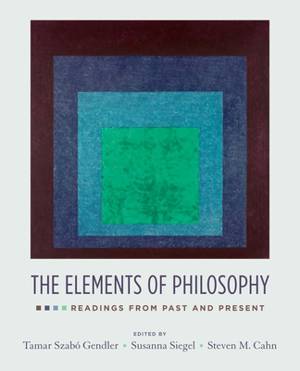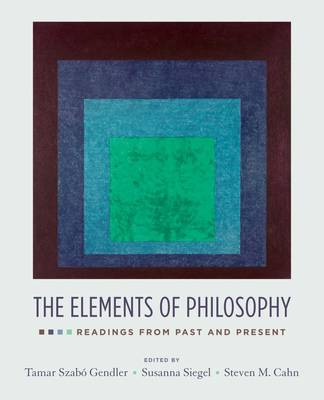
- Afhalen na 1 uur in een winkel met voorraad
- Gratis thuislevering in België vanaf € 30
- Ruim aanbod met 7 miljoen producten
- Afhalen na 1 uur in een winkel met voorraad
- Gratis thuislevering in België vanaf € 30
- Ruim aanbod met 7 miljoen producten
Zoeken
The Elements of Philosophy
Readings from Past and Present
Susanna Siegel, Steven M Cahn, Tamar Szabo Gendler
Paperback | Engels
€ 79,95
+ 159 punten
Omschrijving
The Elements of Philosophy: Readings from Past and Present offers an extensive collection of classic and contemporary readings, organized topically into five main sections: Religion and Belief, Moral and Political Philosophy, Metaphysics and Epistemology, Philosophy of Mind and Language, and Life and Death. Within these broad areas, readings are arranged in clusters that address both traditional issues--such as the existence of God, justice and the state, knowledge and skepticism, and free will--and contemporary topics--including God and science, just war theory, vegetarianism, and time travel. Carefully chosen selections from a wide range of pre-20th-century philosophers are paired with writings from more than fifty leading contemporary philosophers and thinkers. The traditional philosophers represented range from Plato and Aristotle to Immanuel Kant and A.J. Ayer; the contemporary philosophers include Saul Kripke, David Lewis, Thomas Nagel, Derek Parfit, Hilary Putnam, Robert Nozick, Judith Jarvis Thomson, John Rawls, Bernard Williams, and Susan Wolf. Also included are selections from linguist Noam Chomsky, physicist Albert Einstein, and psychologist William James.
Edited by a team of scholars who are also highly esteemed instructors, The Elements of Philosophy is uniquely student-friendly. A team of undergraduate philosophy majors played a central role in helping to select topics, choose readings, and identify terms likely to require clarification. In response to their suggestions, the volume includes detailed introductions to each section, explanatory footnotes that define unfamiliar terms and concepts, an extensive glossary, and a guide to further resources. A companion Instructor's Manual, available on CD, offers article summaries, suggested essay questions, reading guides, model handouts, and sample syllabi. One of the most extensive and expansive anthologies available, The Elements of Philosophy is an ideal choice for both general and targeted introductory philosophy courses.
Edited by a team of scholars who are also highly esteemed instructors, The Elements of Philosophy is uniquely student-friendly. A team of undergraduate philosophy majors played a central role in helping to select topics, choose readings, and identify terms likely to require clarification. In response to their suggestions, the volume includes detailed introductions to each section, explanatory footnotes that define unfamiliar terms and concepts, an extensive glossary, and a guide to further resources. A companion Instructor's Manual, available on CD, offers article summaries, suggested essay questions, reading guides, model handouts, and sample syllabi. One of the most extensive and expansive anthologies available, The Elements of Philosophy is an ideal choice for both general and targeted introductory philosophy courses.
Specificaties
Betrokkenen
- Auteur(s):
- Uitgeverij:
Inhoud
- Aantal bladzijden:
- 816
- Taal:
- Engels
Eigenschappen
- Productcode (EAN):
- 9780195335422
- Verschijningsdatum:
- 26/12/2007
- Uitvoering:
- Paperback
- Formaat:
- Trade paperback (VS)
- Afmetingen:
- 190 mm x 235 mm
- Gewicht:
- 1251 g

Alleen bij Standaard Boekhandel
+ 159 punten op je klantenkaart van Standaard Boekhandel
Beoordelingen
We publiceren alleen reviews die voldoen aan de voorwaarden voor reviews. Bekijk onze voorwaarden voor reviews.











